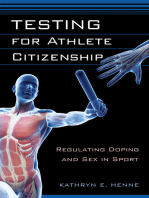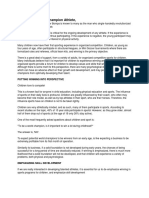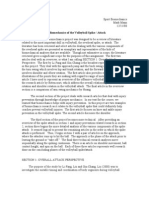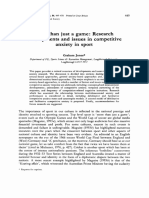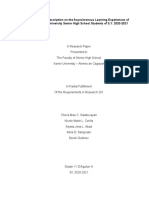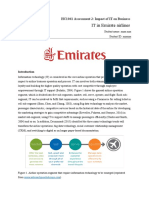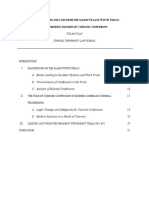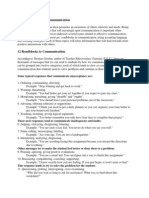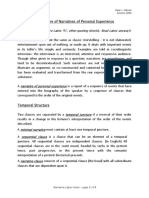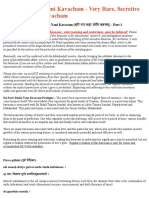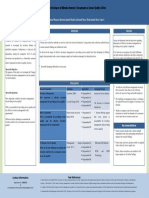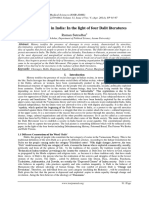Professional Documents
Culture Documents
Doping in Sports Research Paper 2014-05-08
Doping in Sports Research Paper 2014-05-08
Uploaded by
baileytiuOriginal Description:
Copyright
Available Formats
Share this document
Did you find this document useful?
Is this content inappropriate?
Report this DocumentCopyright:
Available Formats
Doping in Sports Research Paper 2014-05-08
Doping in Sports Research Paper 2014-05-08
Uploaded by
baileytiuCopyright:
Available Formats
Tiu1
Bailey Tiu
Ms. Gardner
English 10, Period 1
7 April 2014
Doping in Sports:
The Negative Impact on the World of Sports
To many people, professional athletes serve as role models, heroes, and idols in their life.
However the use of performance enhancing drugs (PEDs) by professional athletes has led many
people to question whether or not these athletes are truly elite. A 2012 quote by Tom Murray,
says that The first hard truth about elite sports is that its relentless competitiveness, and the tiny
margins that separate winners from also-rans, press athletes not to surrender anything that gives
them an edge (1). The argument for the positive reasons for use of PEDs is obvious in David
Ewing Duncans, article that stated research has suggested that these meds help injured athletes
to better heal (1). What both Murray and Duncan are noting in their articles are valid points of
view. However, the key difference between their views is that Murray is saying that PEDs are
being used to artificially to be better than their elite competition while Duncan is just stating that
PEDs have some positive use during recovery. These drugs, such as steroids, should not be used
without proper regulation because taking steroids to help an athlete perform better while
completely healthy has unknown long-term effects.
The usage of PEDs or steroids is already banned from almost all professional sports such
as baseball and cycling, yet athletes continue to use these drugs to enhance their natural
Tiu2
capabilities. The story of Lance Armstrong has Tom Murray stating that Some critics say the
problem isn't athletes who break the rules but the rules themselves specifically, the prohibition
on doping. Lance Armstrong's supporters are running out of plausible defenses (1). Because of
athletes like Lance Armstrong, not only are fans retreating from loving the sport of cycling, but
people are beginning to doubt all athletes clean or not whether they are a fraud or a true elite
athlete. For instance, in todays Major League Baseball (MLB), if an up and coming baseball
player like Mike Trout were to hit over 50 homeruns in a season, the average fan may wonder if
Trout is on steroids. Referring to Baseballs Almanac, the average number of home runs for a
home run leader in MLB over the past 5 years (2009-2013) is 39 home runs in a season.
Compare that to a 5 year span during MLBs steroids era (1998-2002) in which the average
home run leader achieved 61 homers in a typical season.
In addition to fans questioning if an athlete is cheating or not with PEDs, another key
reason why there should be more regulation on PEDs is because athletes wont confess to taking
PEDs on their own accord I find it very hard to believe that every doper out there suddenly
decides to quit on his own accord (Routley 3). If leagues and our national government do not do
something to stress the importance of clean athletes then cheating athletes will simply think that
it is appropriate to take drugs such as steroids, stimulants, and painkillers. Clearly, those athletes
that cheat will not stop themselves unless something impactful gets in their way. Some would
argue that the only way to significantly reduce the usage of PEDs is to bring professional sports
leagues and the government together to develop a meaningfully way to regulate it. For example,
what if a professional baseball player gets caught taking PEDs? He is suspended or banned from
league. If the government got involved and enforced regulation, this player not only would be
Tiu3
banned from the league but he would also have to serve time in jail. This added consequence
would likely make athletes to think twice before using PEDs.
Some experts and reporters have different opinions on the topic of taking PEDs.
Reporters such as Tim Cowlishaw and David Ewing Duncan have done research and written
about the varying ideas surrounding the use of PEDs by athletes such as Lance Armstrong
(Cycling), Alex Rodriguez (Baseball), and Lyndsey Vonn (Skiing). One key point in their
research noted that We don't know exactly know what anabolic steroids do and don't do to
people 10 to 20 years after they are used (Cowlishaw 2). This big unknown should be enough
reason for athletes to stay away from PEDs but without proper regulation; those athletes are just
thinking of today and not what it might cost them when they are older. The issue of using PEDs
to better the performance of an athlete has not been properly addressed and more data is needed.
There isnt really an argument for the use of PEDs. Cowlishaw attempts to persuade his readers
to support PEDs by using the fallacy of avoiding the question. Meaning that since we are
unsure of what PEDs may do to people in 10 to 20 years, they might be OK in the long run.
David Ewing Duncan highlighted support for the use of PEDs in an article he wrote, "An
Easy Way to Improve the Olympics: Make Performance Enhancements..." (Article 1). Duncan
also noted that, After all, research has suggested that these meds help injured athletes to better
heal (1). What Duncan is referring to is PEDs as meds or medicines. Even if the recovery time
for athletes are shortened, we cant fully believe Duncans statement is completely true because
referring back to what Cowlishaw said, we dont know what drugs such as steroids can do to a
person 10 to 20 years from now. Yes, PEDs can temporarily help injured athletes to better heal
yet, we dont fully understand the long-term effects.
Tiu4
The intake of PEDs has built up a huge controversial issue between athletes and
investigators. Yet there is one specific group of people that make professional sports the way
they are today: Fans! Fans are one reason why the issue of intake of PEDs is under so much
controversy. What if fans don't care if a player is using performance-enhancing drugs?
(Duncan 1). In another statement, Duncan contradicted himself by saying that PEDs can help
better heal and suggests that it can quicken the recovery time. The question could be why would
he want someone like Lyndsey Vaughn to quicken her recovery time? Could it be so she can get
back on the slopes sooner? Maybe to compete again sooner? Or perhaps so that she can perform
and do what she does best entertain the fans through competition sooner. That entertainment
for fans can draw millions of people to stadiums and television to watch athletes compete. These
millions of fans and viewers may point to money as a reason for why athletes would risk using
PEDs.
The money involved in sports are very real and the competition fierce. For instance, a
baseball player that has a good season with over 40 home runs might get a new contract for
millions. The other side of the coin is that he gets hurt, gets cut from the team and is out of the
league. So money could definitely be a serious driver for athletes risking PEDs.
All the debate about whether or not athletes should be allowed to take PEDs should
concern the authorities that have power and authority to make a difference and make a final
decision. Both opinions on intake of these drugs should be respected yet, like reporter Will
Routley stated, What have they done to improve the sport? On one hand PEDs can be useful
like when Lyndsay Vonn could have taken drugs such as these to quicken her recovery time of
injury. Although, on the bad side, if an athlete takes a drug like steroids and is completely
healthy and only wants to immensely improve his or her concentration or strength, then that is an
Tiu5
example of why PEDs should be banned. Although the biggest downside to athletes might be the
unknown around what PEDs may do to their health long-term, getting caught is usually very
public and it can hurt their reputation as a professional thus costing them money, sponsorships,
or their job.
Athletes have the right to do what they believe is right for them, especially in the United
States. Evaluating whether or not to allow any athlete, especially professional athletes, to take
PEDs such as steroids is a topic that can have a huge impact to the sports world. Its unlikely that
we will see a major change in the number of athletes taking PEDs in secret. Changing what
happens when athletes are caught taking PEDs are in the hands of health officials, the
government, professional leagues, and fans. Those groups have to be involved in order to solve
this significant problem.
Tiu6
Allenby, Braden. "After Armstrong's Fall, the Case for Performance Enhancement." Washington
Post 2012 oct 28: B.4. Web. 7 May 2014. <http://sks.sirs.com>.
Cowlishaw, Tim. "If All PEDs Were Legal, It Wouldn't Be Cheating--Would It?"Pittsburgh
Post-Gazette 2013 feb 07: A.6. Web. 7 May 2014. <http://sks.sirs.com>.
Duncan, David Ewing. "An Easy Way to Improve the Olympics: Make Performance
Enhancements..." Newsweek 2014 feb 21: N.p. Web. 7 May 2014. <http://sks.sirs.com>.
Koller, Dionne. "USADA for Everyone." Baltimore Sun 2013 jan 20: A.27. Web. 7 May 2014.
<http://sks.sirs.com>.
Murray, Tom. "Why Sports Needs Rules Against Doping." Washington Post2012 nov 24: A.15.
Web. 7 May 2014. <http://sks.sirs.com>.
Routley, Will. "Dopers Are Not Victims." Vancouver Sun 2012 nov 06: C.9. Web. 7 May 2014.
<http://sks.sirs.com>.
Young, Geisler. "Home Runs Year-by-Year Leaders on Baseball Almanac."Home Runs Year-by-
Year Leaders on Baseball Almanac. Baseball-almanac, 2000. Web. 07 May 2014.
You might also like
- Britania James Social Studies SbaDocument13 pagesBritania James Social Studies SbaBreniqueNoch keine Bewertungen
- Fitness Determinants of Success in Men's and Women's FootballDocument9 pagesFitness Determinants of Success in Men's and Women's FootballAngelos BarbasNoch keine Bewertungen
- Introduction To Yoga PhilosophyDocument33 pagesIntroduction To Yoga PhilosophyRahul Valiyakulangara100% (1)
- Doping in Sports Research Paper Final DraftDocument7 pagesDoping in Sports Research Paper Final Draftapi-325899836100% (1)
- MLA Format EssayDocument4 pagesMLA Format EssayPaigeNoch keine Bewertungen
- Warm-Up Reduces Delayed-Onset Muscle Soreness But Cool-Down Does Not A Randomised Controlled TrialDocument6 pagesWarm-Up Reduces Delayed-Onset Muscle Soreness But Cool-Down Does Not A Randomised Controlled TrialMyra AshilaNoch keine Bewertungen
- The Nature and Prevalence of Injury During CrossFit TrainingDocument22 pagesThe Nature and Prevalence of Injury During CrossFit TrainingThiago Bonatto100% (1)
- Sport As A Vehicle For Deploying Corporate Social ResponsibilityDocument12 pagesSport As A Vehicle For Deploying Corporate Social Responsibility3BL Media StaffNoch keine Bewertungen
- Impact of Crossfit Related Spinal InjuriesDocument4 pagesImpact of Crossfit Related Spinal Injuriesjoao manoelNoch keine Bewertungen
- Case Study On Org Culture and Job SatisfactionDocument3 pagesCase Study On Org Culture and Job SatisfactionApoorv Srivastava100% (1)
- Doping in Sports Annotated BibliographyDocument7 pagesDoping in Sports Annotated Bibliographyapi-486512251Noch keine Bewertungen
- Doping in SportsDocument9 pagesDoping in Sportsursvenki4ever3793Noch keine Bewertungen
- Nutrition and Culture in Professional Football. A Mixed Method Approach-AnnotatedDocument7 pagesNutrition and Culture in Professional Football. A Mixed Method Approach-AnnotatedChris FieldNoch keine Bewertungen
- Zzoolla Filsafat LTAD Voli PDFDocument64 pagesZzoolla Filsafat LTAD Voli PDFlinecutengetzNoch keine Bewertungen
- Coaching Young Endurance Runners 2 PDFDocument16 pagesCoaching Young Endurance Runners 2 PDFmhza82178Noch keine Bewertungen
- Doping in SportDocument13 pagesDoping in SportFaizeen RazakNoch keine Bewertungen
- Sports Psychology: Topic: Team CommunicationDocument4 pagesSports Psychology: Topic: Team CommunicationdhwaniNoch keine Bewertungen
- Agility in Team Sports - Testing, Training and Factors Affecting Performance PDFDocument22 pagesAgility in Team Sports - Testing, Training and Factors Affecting Performance PDFHarri100% (1)
- Testing for Athlete Citizenship: Regulating Doping and Sex in SportFrom EverandTesting for Athlete Citizenship: Regulating Doping and Sex in SportNoch keine Bewertungen
- Prof. v. S. Rathore - Sports MedicineDocument55 pagesProf. v. S. Rathore - Sports MedicineSerendipity Felicity100% (1)
- Overtraining Syndrome (Acsm)Document37 pagesOvertraining Syndrome (Acsm)Diego D ToledoNoch keine Bewertungen
- Impact Factors of Journals in Sport and ExerciseDocument3 pagesImpact Factors of Journals in Sport and ExerciseJad Adrian WashifNoch keine Bewertungen
- High Altitude TrainingDocument1 pageHigh Altitude TrainingAdam Jones100% (1)
- Scientific Sports Findings: The #1 Key to Massive Endurance Gains & Super Fast RecoveryFrom EverandScientific Sports Findings: The #1 Key to Massive Endurance Gains & Super Fast RecoveryNoch keine Bewertungen
- Kicking Biomechanics - Importance of Balance - Lower Extremity Review MagazineDocument10 pagesKicking Biomechanics - Importance of Balance - Lower Extremity Review Magazinemareco1Noch keine Bewertungen
- A Profile of Sports Science Research (1983-2003)Document8 pagesA Profile of Sports Science Research (1983-2003)GoranMarkovicNoch keine Bewertungen
- Overtraining and Recovery KenttaDocument16 pagesOvertraining and Recovery KenttaLuiza Carolina100% (1)
- Factors That Cause Athlete BurnoutDocument14 pagesFactors That Cause Athlete Burnoutapi-510291915Noch keine Bewertungen
- A Coaches Dozen 12 Fundamental Principles For.13Document3 pagesA Coaches Dozen 12 Fundamental Principles For.13Rodulfo AlvaradoNoch keine Bewertungen
- Lecture 1 - What Is Sports PsychologyDocument6 pagesLecture 1 - What Is Sports PsychologyAirama VaneitenNoch keine Bewertungen
- UKSCA Position Statement Final PDFDocument14 pagesUKSCA Position Statement Final PDFHari SetiawanNoch keine Bewertungen
- Intermitente Fitness Test (IFT 30-15) (En Inglés)Document9 pagesIntermitente Fitness Test (IFT 30-15) (En Inglés)Nicolás Di SantoroNoch keine Bewertungen
- Worries and Fears Associated With Competitive GymnasticsDocument18 pagesWorries and Fears Associated With Competitive GymnasticsJonathan RolfsenNoch keine Bewertungen
- Talent Selection, - Identification and - Development Exemplified in The Australian TALENT SEARCH ProgrammeDocument6 pagesTalent Selection, - Identification and - Development Exemplified in The Australian TALENT SEARCH ProgrammeMarthinus SchultzNoch keine Bewertungen
- Injuries, Risk Factors and Prevention Initiatives in Youth SportDocument27 pagesInjuries, Risk Factors and Prevention Initiatives in Youth SportDonny KurniawanNoch keine Bewertungen
- Training and Testing The Elite AthleteDocument14 pagesTraining and Testing The Elite AthleteGabriel ZahariaNoch keine Bewertungen
- Reporter # 1 History of Sport PsychologyDocument15 pagesReporter # 1 History of Sport PsychologyJasmine Erika L. Do-omaNoch keine Bewertungen
- 1999 - C. Pigeassou - Epistemological Issues On Sport TourismDocument11 pages1999 - C. Pigeassou - Epistemological Issues On Sport TourismCarlos Cardoso JiménezNoch keine Bewertungen
- History of Doping in SportDocument35 pagesHistory of Doping in SportZrinko Čustonja100% (1)
- Homenkova Dev of Strength in Physical ConditioningDocument6 pagesHomenkova Dev of Strength in Physical ConditioningHarcownik Rafał100% (1)
- Exercise PhysiologyDocument11 pagesExercise Physiologyapi-284302840Noch keine Bewertungen
- 2c Sport-Specific Nutrition Main Document May 2021Document9 pages2c Sport-Specific Nutrition Main Document May 2021Martin WechselbergerNoch keine Bewertungen
- Sport and Psychology - Giorgi LazarashviliDocument6 pagesSport and Psychology - Giorgi LazarashviliGiorgi Lazarashvili100% (2)
- Javelin Training in Finland: by Esa UtriainenDocument5 pagesJavelin Training in Finland: by Esa UtriainenAndreia NicolauNoch keine Bewertungen
- Childhood To Champion AthleteDocument4 pagesChildhood To Champion AthletemalNoch keine Bewertungen
- Biomechanics of Volleyball SpikesDocument20 pagesBiomechanics of Volleyball SpikesMujid Benazer100% (2)
- Manav Rachna Sports Science BrochureDocument23 pagesManav Rachna Sports Science Brochurealbha oberoiNoch keine Bewertungen
- Encyclopedia of Anti Doping 2000 2015 PDFDocument4,506 pagesEncyclopedia of Anti Doping 2000 2015 PDFLeandro NascimentoNoch keine Bewertungen
- Anxiety in Sport Jones1995Document30 pagesAnxiety in Sport Jones1995attilal_5100% (1)
- L1 Coaching Swimming SpecificationsDocument32 pagesL1 Coaching Swimming SpecificationsShehan Timothy De AlwisNoch keine Bewertungen
- Grigory Vorobiev PDFDocument3 pagesGrigory Vorobiev PDFmisanthropo100% (2)
- Tennis: Isner in ControlDocument16 pagesTennis: Isner in ControlNewYorkObserverNoch keine Bewertungen
- Pregnancy in Sport ASCDocument38 pagesPregnancy in Sport ASCSri Nor SyazwaniNoch keine Bewertungen
- Sports Science and NutritionDocument40 pagesSports Science and NutritionMuthu KumaranNoch keine Bewertungen
- Lesson 7 Gender and SportsDocument3 pagesLesson 7 Gender and SportsALLEN GLENNNoch keine Bewertungen
- Sport InjuriesDocument8 pagesSport InjuriesmikudadoNoch keine Bewertungen
- Training or SynergizingDocument13 pagesTraining or SynergizingScott_PTNoch keine Bewertungen
- Handball CMJDocument6 pagesHandball CMJBubela AlexandraNoch keine Bewertungen
- Under-Recovery and Overtraining: Different Concepts - Similar Impact?Document5 pagesUnder-Recovery and Overtraining: Different Concepts - Similar Impact?Rei ArturNoch keine Bewertungen
- Psychological Aspects of Rehabilitation Following Athletic InjuriesDocument26 pagesPsychological Aspects of Rehabilitation Following Athletic InjuriesVasilis100% (3)
- A Field Guide to Athlete Performance: The 24 Hour AthleteFrom EverandA Field Guide to Athlete Performance: The 24 Hour AthleteNoch keine Bewertungen
- The Siege of The Walled City of Jerusalem 14 May 15 December 1948Document8 pagesThe Siege of The Walled City of Jerusalem 14 May 15 December 1948mincayaNoch keine Bewertungen
- Chapter 1 Mini Task 1Document5 pagesChapter 1 Mini Task 1Cheza GaabucayanNoch keine Bewertungen
- IT Airline - Emirate AirlineDocument9 pagesIT Airline - Emirate AirlinechangnoiooNoch keine Bewertungen
- Lessons Learned and Lost From The Salem Village Witch Trials - The Enduring Dangers of Coerced ConfessionsDocument34 pagesLessons Learned and Lost From The Salem Village Witch Trials - The Enduring Dangers of Coerced ConfessionsKylah ClayNoch keine Bewertungen
- 21st Century LearningDocument32 pages21st Century LearningAnnalyn Torrible100% (1)
- ESL Lesson On Roald DahlDocument11 pagesESL Lesson On Roald Dahll_fakhryNoch keine Bewertungen
- The Law, Policy and Politics of The Un Human Rights CouncilDocument304 pagesThe Law, Policy and Politics of The Un Human Rights CouncilselenNoch keine Bewertungen
- JGURuleson Gender Sensitizationagainst Sexual HarassmentDocument20 pagesJGURuleson Gender Sensitizationagainst Sexual HarassmentYash DahiyaNoch keine Bewertungen
- Rental Car CVDocument2 pagesRental Car CVmohammed naveedNoch keine Bewertungen
- American CH 17 Study GuideDocument4 pagesAmerican CH 17 Study GuideAndrew IrizarryNoch keine Bewertungen
- Eleatic Questions Author(s) : G. E. L. Owen Source: The Classical Quarterly, New Series, Vol. 10, No. 1 (May, 1960), Pp. 84-102 Published By: On Behalf of Stable URL: Accessed: 22/06/2014 05:15Document20 pagesEleatic Questions Author(s) : G. E. L. Owen Source: The Classical Quarterly, New Series, Vol. 10, No. 1 (May, 1960), Pp. 84-102 Published By: On Behalf of Stable URL: Accessed: 22/06/2014 05:15Anand SadasivanNoch keine Bewertungen
- CommunicationDocument8 pagesCommunicationAtanu MaityNoch keine Bewertungen
- Notes On Labov 97 Narrative AnalysisDocument8 pagesNotes On Labov 97 Narrative AnalysisMarisa HerasNoch keine Bewertungen
- Sri para Maha Yoni Kavacham - Very Rare, Secretive and Powerful KavachamDocument18 pagesSri para Maha Yoni Kavacham - Very Rare, Secretive and Powerful KavachamJag VrNoch keine Bewertungen
- Rope Holder - 30 OctoberDocument4 pagesRope Holder - 30 OctoberMinnie Sugitha DevakaNoch keine Bewertungen
- Music9 Quarter1 Module 1 FinalDocument21 pagesMusic9 Quarter1 Module 1 FinalJoshua VillamorNoch keine Bewertungen
- ARM Effective Inventory ManagementDocument1 pageARM Effective Inventory ManagementNazir AnsariNoch keine Bewertungen
- Bai Tap Infinitive and GerundDocument5 pagesBai Tap Infinitive and Gerundngn teddybearNoch keine Bewertungen
- Abbott v. Alcaraz DissentDocument25 pagesAbbott v. Alcaraz DissentpolbisenteNoch keine Bewertungen
- Sentiment Analysis of Reddit Comments On Israel and Palestine Conflict: A Social Discourse StudyDocument17 pagesSentiment Analysis of Reddit Comments On Israel and Palestine Conflict: A Social Discourse StudyAhtisham KhalidNoch keine Bewertungen
- GAMABA AwardeeDocument1 pageGAMABA AwardeeCeasar Epsilonian Mundala100% (7)
- The Holy Trinity: Quintus Septimius Florens TertullianusDocument1 pageThe Holy Trinity: Quintus Septimius Florens TertullianusDaniella Faye NgoNoch keine Bewertungen
- Write The Missing Words of The Verb To Be (Affirmative Form)Document1 pageWrite The Missing Words of The Verb To Be (Affirmative Form)Daa NnaNoch keine Bewertungen
- AngleDocument7 pagesAngleNguyễnTúSơnNoch keine Bewertungen
- Asagao CaseDocument5 pagesAsagao CasePrerna RaghuwanshiNoch keine Bewertungen
- Dalit Movement in India PDFDocument7 pagesDalit Movement in India PDFSuvro MallickNoch keine Bewertungen
- End of QuizDocument13 pagesEnd of QuizKhaye SabaytonNoch keine Bewertungen




















